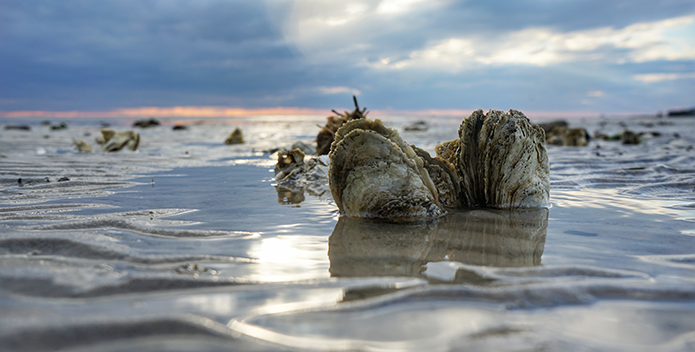It's hard to imagine. A truly mesmerizing and spellbinding observance from Captain John Smith's first exploration of the Chesapeake in 1608, Smith detailed how oysters "lay thick as stones." But after centuries of disease, pollution, and overharvesting, this cornerstone of the Bay's environment, economy, and culture is at a fraction of historic levels.
Following decades of hard work, we are making progress restoring the Bay's native oyster population. And two complementary bills before the Maryland General Assembly would provide a path to restore our iconic oyster and the marine life that depend on them by permanently protecting five of Maryland's oyster restoration tributaries and creating an oyster fishery management plan.
Five tributaries are key to the Bay's oyster recovery in Maryland, including Harris Creek—the country's largest oyster restoration project. The significant public investments in large-scale restoration projects are working, but there is talk of opening these five tributaries for harvest. House Bill 298/Senate Bill 448 would protect these public investments, demonstrate Maryland's strong commitment to oysters and clean water, and provide tremendous natural benefits to the Bay and the citizens of Maryland.
Maryland's oyster population is half what it was in 1999, according to the first-ever stock assessment. The significant decline is a symptom of years of overfishing. To change this dynamic, House Bill 720/Senate Bill 830 would create a roadmap for increasing the oyster population long-term. Developed by top scientists at the University of Maryland's Center for Environmental Science, this proven approach to fishery management uses science to provide objective analysis of proposed management actions to all stakeholders.
Restoring the Bay's native oyster population is a substantial undertaking. Look no further than the effort from the Chesapeake Oyster Alliance to plant 10 billion oysters in the Bay by 2025. But given the oyster's filtering prowess and its creation of critical habitat, resurrecting this keystone species will make a dramatic difference in saving the Bay.
Will you join us in this fight? Take action—Tell your legislators to support Maryland's oysters and pass this critical legislation!
This Week in the Watershed: Global Solutions, Cleaning Up Coal Ash, and Legal Battles
- The rural Virginia community of Union Hill is the center of an environmental justice battle that is receiving national attention. (Washington Post)
- Leaders in Hampton Roads are looking to global solutions to address their flooding challenges and calling on a new investment tool to make projects a reality. (Daily Press—VA)
- Good news for clean water, as legislation passed in Virginia's General Assembly requires thorough clean ups of coal ash sites. (WVEC—VA) BONUS: CBF Press Statement
- A legal battle over stormwater fees in southern Virginia has ramifications on Bay cleanup efforts. (Roanoke Times—VA) BONUS: CBF Press Statement
What's Happening around the Watershed?
- Annapolis, MD: Interested in having the beachfront wedding of your dreams? Come visit CBF headquarters for our bridal open house. Learn more and register here!
- Annapolis, MD: Join CBF, the Maryland League of Conservation Voters, Sierra Club, and other environmental groups to advocate for Maryland's forests. We are meeting with legislators and sharing information about important legislation that will strengthen and improve Maryland's forest laws. Learn more and register here!
- Easton, MD: Join us for the second event in our Angler's Night Out program series. Gather with anglers and fishing aficionados from around the Shore to watch fishing flicks, hear from experts and guides, and mingle with friends while enjoying food and drink specials. Learn more and register!
- Annapolis, MD: Join CBF and other environmental groups to advocate for Maryland's oysters. We are meeting with legislators and sharing information about important legislation that will help protect and restore this keystone species. Learn more and register here!
- Hopewell, VA: Attend a Tree Pruning 101 workshop, covering basics such as best time of year to prune, how and where to cut limbs, and what types of tools to use. Learn more and register here!
- Weyers Cave, VA: Shenandoah Valley landowners, farm managers, and hunters are invited to join us to learn the ins and outs of planting and maintaining riparian buffers that improve local water quality and support wildlife. Staff from CBF, Natural Resource Conservation Service, and Virginia Department of Forestry will share technical and financial resources that can kickstart projects to plant riparian buffers. Learn more and register here!
March 14
- Newport News, VA: As more local oyster farms are producing oysters, join us to indulge in some this beloved bivalve and learn more about this growing industry from a local oyster farmer. Learn more and register here!
March 19
- Richmond, VA: As more local oyster farms are producing oysters, join us to indulge in some this beloved bivalve and learn more about this growing industry from a local oyster farmer. Learn more and register here!
March 20
- Annapolis, MD: Join us at CBF headquarters for an ice cream social and learn about the Buy Fresh Buy Local Chesapeake program and Clagett Farm's Community Supported Agriculture program. Learn more and register here!
March 21
- Baltimore, MD: Join us for our Docs on the Docks film series, featuring the new documentary Saving Sea Turtles. This film highlights the history of the Kemp's Ridley sea turtles and how humans have impacted the species' population. Immediately following the viewing, an expert panel will discuss the film and encourage participants to advocate for change in their communities, city, and watershed. Register here!




